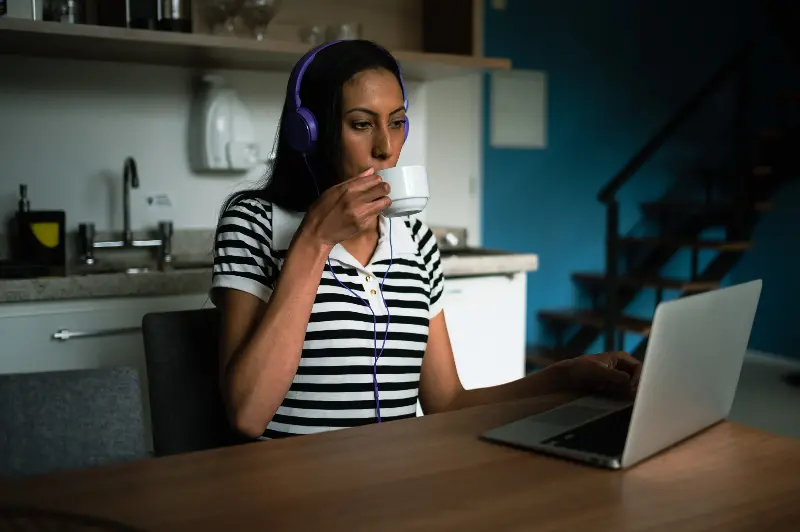
A viral TikTok video that pokes fun at the remote workforce has prompted viewers to share how they keep their "active" status' alive on Microsoft Teams while working from home.
The video has racked up more than 1.2 million views and 174,000 likes since it was posted on June 13 by @bakingandbooks. The short clip captures the everyday ritual of many remote workers of checking in on a computer while working from home. Viewers were able to see the video's creator walk into a room, glance at her laptop screen and walk out, accompanied by the overlaid text: "How I walk into my office to check that I'm still active on Teams."
In the comments, viewers described their own efforts to simulate busyness while working remote, joking about mouse jigglers and perfectly timed keyboard taps. Others noted the behavior as a symptom of a broader anxiety that has come to define the remote work experience—one tied closely to the visibility of one's status online.
"Honestly, most managers are aware of these tricks," Radvile Sliogeryte, a talent acquisition specialist, told Newsweek. "But good managers care more about what you actually accomplish than whether you are at your laptop all day."
That perspective may be welcomed by those whose habits mirror what is parodied in the viral TikTok video.
As one viewer commented: "And you wonder why companies are going back to the office."
For some, the performative check-ins are part of an ongoing attempt to appear constantly present, despite the realities of at-home work life.
"Let's be real, nobody works non-stop for eight hours, even in an office setting," Sliogeryte said. "Short breaks to stretch, walk, or just look out a window are healthy and actually help with productivity.
"Both managers and employees should see these pauses as a necessary part of doing good work, not something to hide."
Licensed workplace mental health expert Christina Muller told Newsweek that the expectation to be "always on" gained traction during the early days of the pandemic, when remote work first became the norm.
"With the rise of remote work during COVID, many employees felt an expectation to be 'always on' to show, or even prove, they were being productive," Muller said. "Inactivity could be perceived as inefficiency, but the irony is that you can be cruising LinkedIn or looking up a recipe while your green light stays active on Teams, even though you are not actually working."
That discrepancy has contributed to a rise in burnout, she said, adding that leaders can help by encouraging microbreaks throughout the day to stretch or grab a cup of tea or coffee.
"Research shows that our brains need breaks to fully process and integrate information," she said. "Without them, we often see what look like careless mistakes, reduced creativity, and lower-quality work."
As amusing as the video may be, many workers are caught between wanting to preserve autonomy and fearing that any moment of offline status could be interpreted as disengagement. Several viewers took to the comments to share how they navigate appearing online while working from home, without having any actual tasks to accomplish that would keep them online.
"Buy a mouse mover on Amazon," one viewer said.
"Checking I'm still in my fake call with myself that's been going on for the last 4 hours," another added.
"Tip for everyone: open up your Teams chat with yourself, select the chatbox as if you were going to type, put an item on the space bar...Sop it from going offline," a third viewer shared. "You're welcome."
Another viewer shared a different sentiment: "I've straight up set my status to permanently offline."
"Teams is the biggest corporate bootlicker," another added.
"People naturally do not want to feel micromanaged," Muller said. "When leaders build in a little more autonomy, employees are less likely to feel the need to game the system."
For Sliogeryte, the issue goes beyond work tools and screen time.
"If you feel constant guilt about stepping away and feel like you have to 'pretend,' those are signs of fear," she said. "And you might want to reconsider whether the job or company culture is the right fit for you."
Newsweek reached out to @bakingandbooks for more information via TikTok.
Have you had a workplace dilemma? Let us know via [email protected]. We can ask experts for advice, and your story could be featured on Newsweek.
